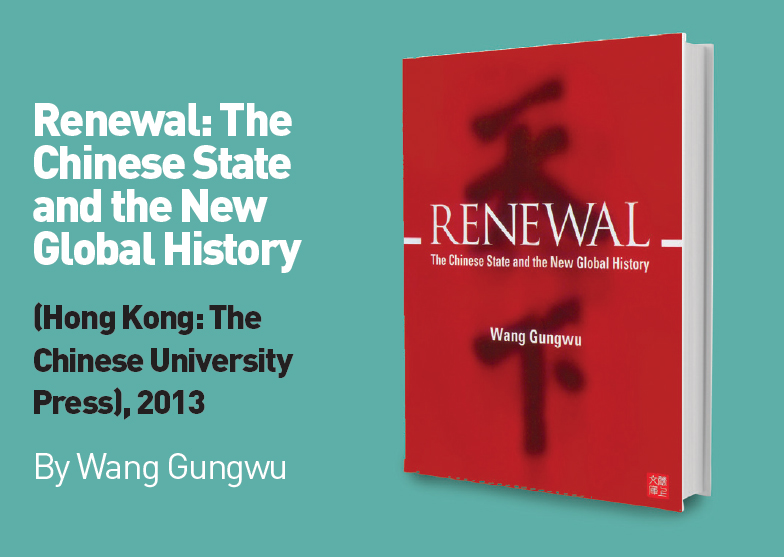
In the field of International Relations (IR), there has been an effort to go beyond Eurocentric (US-dominated) perspective of IR by looking at non-Western IR theory. Some 15 years ago, Chinese IR theory emerged with three distinctive threads – (1) Imported IR theories available in PRC; (2) Mainstream efforts building an ‘IR theory with Chinese characteristics’ ; and Budding movements to construct from ancient Chinese philosophy (origin). These disparate theorisation efforts are persuasively presented by Wang Gungwu in this book. (Editor’s note: Professor Wang Gungwu is the Chairman of the East Asian Institute and University Professor, National University of Singapore. He is also Emeritus Professor of the Australian National University.)
Given his extensive research of China and overseas Chinese, as well as his ability to read classical Chinese works, Wang was able to make broad-brushed yet historically-grounded generalisations of Chinese history and their cultural (Confucian) dispositions, linking these to modern China. Simply put, China is torn between affirming the integrity of its history, with Sino-centric bias, and accepting world history in the Eurocentric (Westphalian) tradition as the norm.
As his first sentence elegantly puts it: ‘Old China lived on its past. New China uses it to serve the present.’ Confucian tradition ‘shaped a distinct Chinese worldview’. The Chinese World Order revolved around the concept of ‘All Changes Under Heaven’ (Tianxia 天下) , an inclusive concept that embraces the progressive rise of Chinese civilisation (to seek improvement). This is manifested in Middle Kingdom/ Central State (Zhongguo 中国) as a political order that served as a source of moral authority; and the Confucian-based hierarchical tributary system, based on rule by moral example, reciprocity and persuasion, and kept peace through the Confucian principle of Great Harmony-withdifference (合而不同 he er bu tong).
China: The Civilisational Misfit
In 1861, however, China had to play by Western rules. It acknowledged Western concepts of sovereignty and equality with the establishment of the prototype Foreign Office (Zongli Yamen 总理衙门) and the use of international law in 1880.
This structural effect of the Westphalian system prevented the Chinese civilisation from drawing from its 2,500 years of traditional scholarship to contribute anything new except those within the fixed boundaries pre-set. Chinese ideas stressing moralistic, voluntaristic, familial and hierarchical understandings of power were irrelevant.
Chinese emphasis on legitimacy as indicated by each dynasty’s capacity to protect its borders and people from close-by enemies was irrelevant in the face of sovereignty, the new basis of IR. Chinese usage of the tributary system, to regulate trade and manage interstate relations with neighbouring states that yearn to learn from the morally superior Zhongguo (“middle kingdom”), was also irrelevant.
Conclusion: Challenges Ahead
Moving ahead, ‘the stronger China becomes, the more fearful its neighbours. If accompanied by nationalism, China would find it difficult to convince its neighbours of its best intentions’. Indeed, in late Qing dynasty, tributary states included Korea, Ryukyu Kingdom (now Okinawa), Vietnam, Laos, Burma, Siam and Sulu; Taiwan, Macau andHong Kong were considered part of China carved out by colonial powers.
Hence, while Tibet, Taiwan and Xinjiang can be arguably viewed as domestic issues to keep the Chinese civilisation (Tianxia = modern multinational state) intact, any hints of transgressions beyond will alert its neighbours. This is notwithstanding the over-used case of seven peaceful missions by Ming dynasty Zhenghe to reach the farther shores of the Indian Ocean and East African coast, without colonisation but merely a desire for the world to know of China’s majesty and moral superiority. China is in a state of constant renewal.
Wang noted that China had many revolutions (geming 革命) and used different parts of their heritage to reflect on progress and future directions; these include Deng Xiaoping’s pragmatism ; Mao Zedong’s ideological revolution; Sun Yat-sen’s nationalism and its ancient history of adaptation. The key challenge ahead is how to modernise China’s civilisation so that it would be attractive to non-Han people (especially Tibetans, Uighurs and Mongols).
CCP’s 1986 resolution to build a ‘socialist spiritual civilisation’ is problematic as it replaced an orthodoxy (Confucian state) ideology with another party-state ideology. Moreover, there is no agreement on the core values shared by Chinese of all classes and ethnicity. China is in urgent need of reinvention. Its approach will remain a rich source of inspiration, both to “serve the present’ and to shape the future of a “Chinese model” of international relations
Phua Chao Rong, Charles is a NUS Lee Kong Chian Graduate Scholar and PhD student at the LKY School.